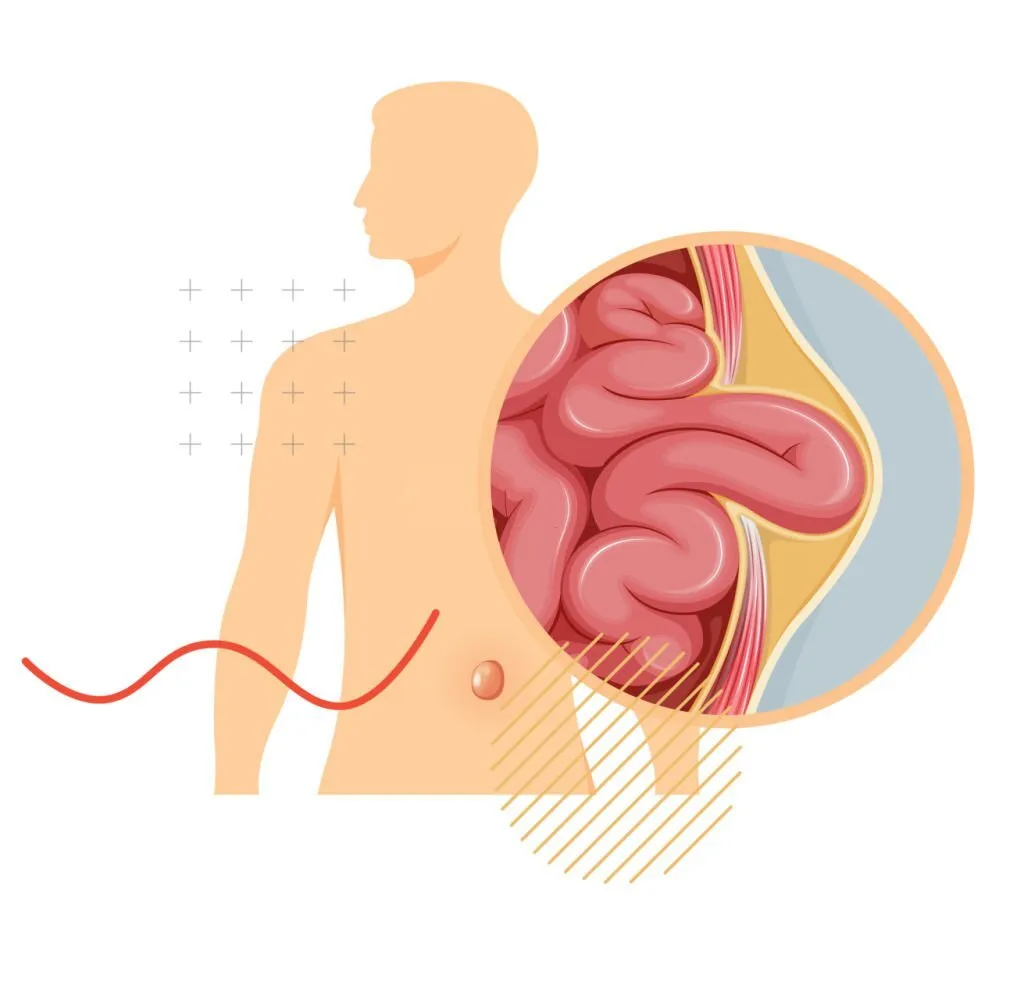Hernia is a medical term for when an internal organ pushes through a weakened opening in your muscle or tissue. This may occur due to a combination of muscle weakness and excess straining. Did you know that there are various types of hernias? Are you aware that surgeries could also lead to hernias? Or that you could also be born with a hernia? Read on to learn more.
What are the types of hernias and how do they occur?
The various types of hernias are discussed below:
Inguinal hernia
The inguinal canal is a path that goes through your inner thigh. Here, a part of your intestine protrudes into the inguinal canal. The hernia occurs due to a weakness or a tear in your lower abdominal wall.
Hiatal hernia
Here, a part of the stomach pushes through a weakened part of your diaphragm into your chest opening. It occurs due to weakness in the diaphragm.
Congenital diaphragmatic hernia
It is a birth defect seen due to incomplete closure of the diaphragm during foetal development. It is similar to a hiatal hernia leading to crowding in the lung area.
Incisional hernia
In this type of hernia, a part of your internal organ may protrude through an old incisional scar or surgical site. This commonly occurs due to a weakened abdominal wall after surgery.
Umbilical hernia
Here, the intestines push through your weakened abdominal wall near your belly button (umbilicus). It is mostly congenital (present from birth itself).
Ventral hernia
This type of hernia occurs when a part of your internal organ bulges through your weakened abdominal muscle. It can occur from birth or due to factors like pregnancy, obesity, or performing strenuous activities.
What are the symptoms of a hernia?
The symptoms of hernia depend on the type of hernia.
- Inguinal hernia: You may experience a bulge in your inguinal area that cannot be pushed back. This will be accompanied by pain, nausea, and vomiting.
- Hiatal hernia: Here, you may face heartburn (acidity), difficulty swallowing, feeling full after you eat, shortness of breath, and even a backflow of food, liquids, or stomach acids into the food pipe causing discomfort.
- Congenital diaphragmatic hernia: Infants may have difficulty breathing, show a bluish colour (cyanosis due to decreased oxygen), have a faster heart rate and breathing rate, and have an abnormal-looking abdomen with one side bigger than the other.
- Incisional hernia: You may see a bulge in the affected area. It will be accompanied by pain when you cough, sneeze or lift heavy objects, along with a feeling of bloating or constipation.
- Umbilical hernia: You may show symptoms like abdominal pain, fever, vomiting, constipation, and a full round abdomen that may be red or purple.
- Ventral hernia: You may see a bulge in your belly area and severe pain when you sit, stand, strain at stools, or lift heavy objects.
What are the treatment options for hernia?
Surgical treatments for hernias are your only option. However, if you have a minor hernia, your doctor may opt for the wait-and-watch approach. Treatments for hernia are as follows:
Lifestyle modifications
If your hernia is mild or you are awaiting surgical treatment for hernia, the following lifestyle changes can help:
- Relieving your constipation by including fibre-rich food in your diet (fruits, vegetables, and whole grains)
- Avoid large or heavy meals
- Avoid lying down after a meal
- Avoid strenuous activities
- Lose weight if overweight
- Avoid spicy and tomato-based foods to prevent acid from entering your food pipe
- Stop smoking
Surgical treatment or hernia
The surgical treatments for hernia are explained below.
- Open hernia repair surgery: The surgeon will repair the hernia and apply a mesh to reinforce the weakened muscle wall.
- Laparoscopic hernia surgery: It is a minimally invasive surgery (MIS) where the surgeon heals the hernia with a laparoscope (a device with a camera to magnify the internal image to help in its repair)
- Robotic hernia surgery: In this MIS, the surgeon uses robotic arms to repair the hernia.
Compared to open surgical treatment for hernias, MIS are better as they have fewer complications, a better recovery period, and fewer hospital stays.
To sum it up
A hernia can occur in any part of the body and the symptoms depend on the type of hernia. Though surgical treatments are your only option, MIS like laparoscopic hernia surgery and robotic hernia surgery can help in faster recovery. If you are looking for the best institution that offers MIS, Smiles Institute of Gastroenterology is your go-to choice.
Smiles Hospital has state-of-the-art technology. They offer ethical, empathetic, and transparent care. They have 22+ years of experience in performing MIS, so you are in safe hands. Do not hesitate and seek help now!
Call 8099008800 to book an appointment or visit: www.gastroenterology.smileshospitals.com

